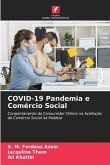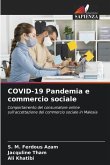Social commerce has emerged due to the rise of online networking, and Malaysian online retailers are reluctant to integrate social commerce. In the wake of the COVID-19 pandemic in Malaysia, this research aims to better understand the acceptance of social commerce by online consumers. It was determined that online social commerce websites are directly used by customers, hence the factors influencing the uptake of social commerce following the COVID-19 pandemic are better understood. A research model demonstrating social commerce acceptance was constructed using the Social Commerce Adoption Model (SCAM), Technology Acceptance Model (TAM), social presence theory, and social comparison theory. Three demographic factors and eight online social comparison trends are included in the model. 150 Malaysian netizens were used to experimentally test the model. Following the COVID-19 pandemic in Malaysia, online social comparison, perceived usefulness, and trust were key drivers of social commerce uptake. Acceptance of social commerce was not affected by demographic factors in the research. In addition, at the end of this research, future lines of research have been outlined. Acceptance of social commerce was not affected by demographic factors in the research. In addition, at the end of this research, future lines of research have been outlined. Acceptance of social commerce was not affected by demographic factors in the research.
Hinweis: Dieser Artikel kann nur an eine deutsche Lieferadresse ausgeliefert werden.
Hinweis: Dieser Artikel kann nur an eine deutsche Lieferadresse ausgeliefert werden.








